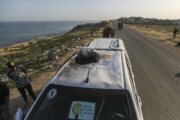BEIRUT — Around the world, COVID-19 has forced school shutdowns and left parents, teachers and students alike struggling with the sudden switch to online learning.
But the transition has been particularly hard for communities with limited access to the internet and mobile devices. In Lebanon, for instance, a majority of the more than 200,000 Palestinian refugees living in the country are below the poverty line.
About 30% of the 37,000 students enrolled in schools run by the United Nations Relief and Works Agency for Palestine Refugees in the Near East (UNRWA) missed out on classes last spring because of difficulties accessing online learning, says Salem Dib, chief of UNRWA’s Field Education Program in Lebanon.
“The digital divide, let me call it, is that some students were not able to join due to unavailability of smart devices, or internet costs or similar issues,” Dib says. “So, because of this, it was a lesson learned to think of other options for students to have them engaged.”
Because so many students missed lessons last year, the agency launched a monthlong review last week to ensure that they will be ready for the coming school year that begins in October. This time, instead of providing all the course materials online, the schools are handing out weekly packets of coursework with written explanations for parents and students. The students can then send pictures of the completed coursework to their teachers.
In Lebanon, school closures to prevent the spread of the coronavirus began in late February. But schools had already seen multiple disruptions earlier in the year as a result of mass anti-government protests that began last October, which often entailed protesters blocking roads and resulted in sporadic closures of schools and other public institutions.
During that time, learning went online, with teachers sending lessons and materials to parents via WhatsApp groups and children completing the work at home with their parents’ assistance.
A Shortage of Computers, Mobile Phones
Even the poorest of families in Lebanon’s Palestinian camps usually have a mobile phone in the house and at least some access to the internet either via Wi-Fi or data. But many do not have a computer, and sharing one phone between multiple children often meant that lessons were missed.
That was the case for Diana Qaed, a mother of five in the Beddawi Palestinian camp in northern Lebanon — home to about 20,000 registered Palestinian refugees. Despite having only completed sixth grade herself, Qaed insists her children should finish school and go on to university. Her oldest daughter, at 17, wants to be a laboratory technician and her 15-year-old daughter dreams of being a heart surgeon.
But during the last school term, her children were barely able to learn.
“I can’t give the phone to five children at once — it’s very difficult,” Qaed says. “I would divide my time so each one would have time with me and try to manage it. Some days I was able to and some days I wasn’t.”
And although Qaed says she was always able to reach out to teachers with questions, she felt unqualified to explain the lessons. Instead, her teenaged children would help the younger ones.
Likewise, fellow Beddawi resident Ghada Mohammed Qaed says her 12-year-old son had been unable to study during the last school term. Her husband, who works in a printing shop, needs to take his phone with him to work, and her own phone’s screen was damaged.
“I wasn’t able to teach him,” she says. “My phone was broken, and the electricity is a disaster in our neighborhood, and the situation is really bad. He wanted to study, but my telephone didn’t help him.”
Ibrahim Mustapha, who used to run a learning center giving after-school tutoring to children in the camp, says he’d initially tried to continue holding lessons online after the school shutdown, but it proved unworkable.
“There are students who wanted to study online, and it wouldn’t continue for more than one or two sessions,” he says. “The electricity would be cut off, or the internet, and we were in the middle of working.”
Preparing for October Classes
To help the students who missed out on classes last year get ready for the upcoming term, Dib says, UNRWA staff held a summer catch-up session in which they distributed tablets to 1,200 families whose children had missed classes in the previous term due to lack of smart devices. The agency also helped pay the costs of the internet for some families unable to afford it.
But Dib says, “I doubt that we will be able to provide for the whole school year communications assistance, because it’s very costly to donors and to UNRWA.” The agency has faced persistent budget shortfalls, especially since the United States cut off its previously substantial funding in 2018.
It remains unclear whether the coming school year in Lebanon, which starts in October, will be fully online or mixed between online and in-person learning. In the meantime, parents say they are happy that at least during the review session that began last week, course materials will be available in paper format.
“I thank the principal a lot for these papers, because they will make things much easier,” says Ghada Qaed, who was picking up packets of coursework last Saturday — science, English, Arabic, geography and math — from Kawkab school in the Beddawi camp, where her son is a student.
But she and the other parents hope that soon their children will be able to attend physical classes again.
“God willing, this year will be better, and the children will be able to study in the schoolhouse and will take in more information,” Diana Qaed says.
More from U.S. News
Coronavirus Cases Rise in Refugee Camps Globally
Pandemic Fuels Refugee Aid Donor Fatigue
The 25 Best Countries in the World
U.N. Program Connects Schools in Lebanon With Refugee Students originally appeared on usnews.com







